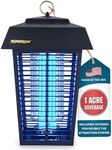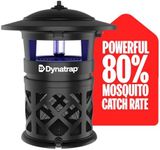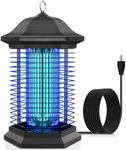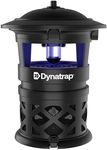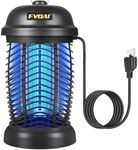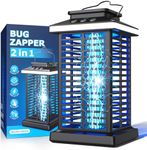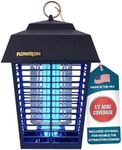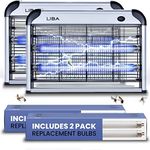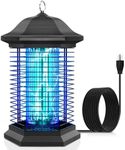Buying Guide for the Best Mosquito Zapper Outdoor
Choosing the right mosquito zapper for outdoor use can significantly enhance your comfort and enjoyment of outdoor spaces. A mosquito zapper works by attracting and killing mosquitoes and other flying insects, helping to reduce the nuisance and potential health risks they pose. When selecting a mosquito zapper, it's important to consider several key specifications to ensure you get a product that meets your needs and performs effectively in your specific environment.Coverage AreaCoverage area refers to the maximum space that the mosquito zapper can effectively protect. This is important because it determines how large of an area the zapper can keep mosquito-free. Coverage areas are usually measured in square feet or acres. For small patios or balconies, a zapper with a coverage area of up to 1,000 square feet may be sufficient. For larger yards or gardens, you might need a zapper that covers up to an acre or more. Choose a zapper with a coverage area that matches the size of the outdoor space you want to protect.
Power SourceThe power source of a mosquito zapper can affect its convenience and placement options. Zappers can be powered by electricity, batteries, or solar energy. Electric zappers need to be plugged into an outlet, which may limit where you can place them unless you use extension cords. Battery-powered zappers offer more flexibility in placement but require regular battery changes or recharging. Solar-powered zappers are eco-friendly and cost-effective in the long run, but their effectiveness can be influenced by the amount of sunlight they receive. Consider your outdoor setup and choose a power source that best fits your needs.
Type of AttractionMosquito zappers use different methods to attract insects, such as UV light, CO2, or chemical attractants. UV light zappers are common and attract insects with ultraviolet light. CO2 zappers mimic human breath to lure mosquitoes, which can be more effective but are often more expensive. Chemical attractants use scents to draw insects in. The type of attraction can impact the zapper's effectiveness and maintenance requirements. If you have a severe mosquito problem, a CO2 or chemical attractant zapper might be more effective. For general use, a UV light zapper is usually sufficient.
Durability and Weather ResistanceSince outdoor mosquito zappers are exposed to the elements, durability and weather resistance are crucial. Look for zappers made from high-quality, weather-resistant materials like stainless steel or heavy-duty plastic. They should be able to withstand rain, wind, and sun without deteriorating. Some zappers are specifically rated for outdoor use and may have additional features like waterproof seals or UV-resistant coatings. If you live in an area with harsh weather conditions, investing in a durable, weather-resistant zapper will ensure it lasts longer and performs reliably.
Ease of MaintenanceEase of maintenance is an important consideration because mosquito zappers need regular cleaning to remain effective. Some zappers have removable trays that collect dead insects, making them easy to empty and clean. Others may require more effort to disassemble and clean. Look for zappers with simple, user-friendly designs that allow for quick and easy maintenance. If you prefer a low-maintenance option, consider a zapper with self-cleaning features or one that requires minimal upkeep. Regular maintenance ensures the zapper continues to work efficiently and prolongs its lifespan.
Noise LevelThe noise level of a mosquito zapper can affect your outdoor experience. Some zappers produce a noticeable buzzing or zapping sound when they kill insects, which can be distracting or annoying. Others operate more quietly, making them better suited for use in areas where you want to relax or entertain guests. If noise is a concern, look for zappers that are specifically designed to operate quietly. Reading user reviews can also give you an idea of the noise level to expect. Choose a zapper with a noise level that matches your tolerance and the intended use of your outdoor space.
